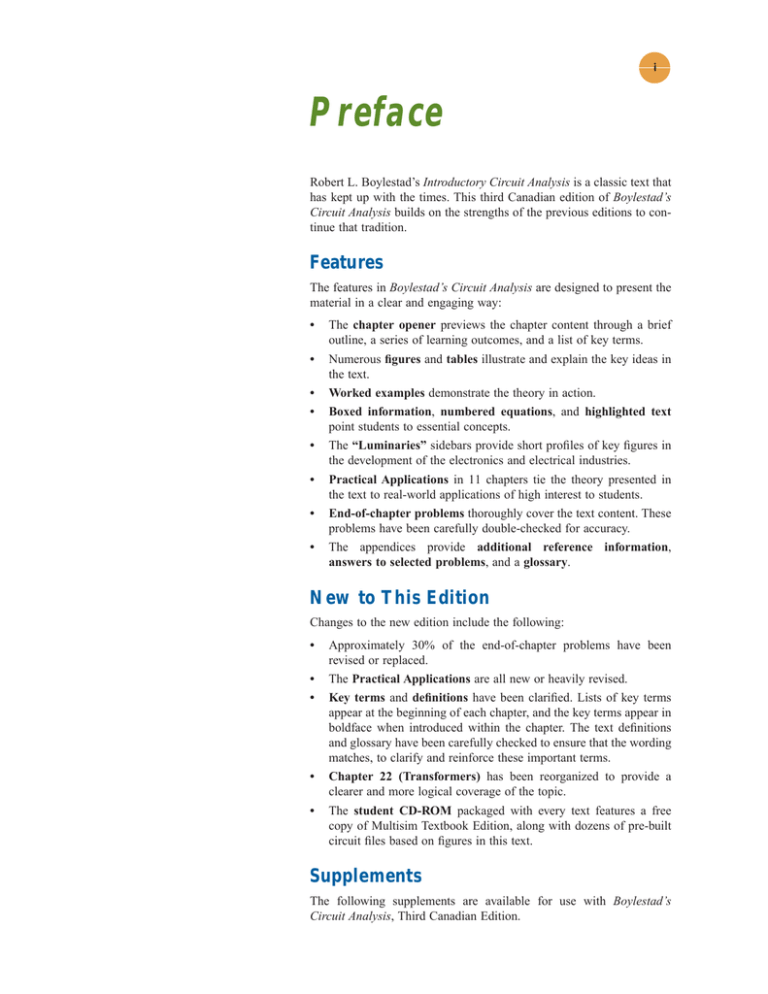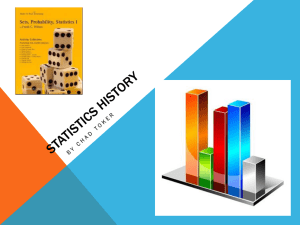open Adobe PDF formatted file
advertisement

i Preface Robert L. Boylestad’s Introductory Circuit Analysis is a classic text that has kept up with the times. This third Canadian edition of Boylestad’s Circuit Analysis builds on the strengths of the previous editions to continue that tradition. Features The features in Boylestad’s Circuit Analysis are designed to present the material in a clear and engaging way: • • • • • • • • The chapter opener previews the chapter content through a brief outline, a series of learning outcomes, and a list of key terms. Numerous figures and tables illustrate and explain the key ideas in the text. Worked examples demonstrate the theory in action. Boxed information, numbered equations, and highlighted text point students to essential concepts. The “Luminaries” sidebars provide short profiles of key figures in the development of the electronics and electrical industries. Practical Applications in 11 chapters tie the theory presented in the text to real-world applications of high interest to students. End-of-chapter problems thoroughly cover the text content. These problems have been carefully double-checked for accuracy. The appendices provide additional reference information, answers to selected problems, and a glossary. New to This Edition Changes to the new edition include the following: • • • • • Approximately 30% of the end-of-chapter problems have been revised or replaced. The Practical Applications are all new or heavily revised. Key terms and definitions have been clarified. Lists of key terms appear at the beginning of each chapter, and the key terms appear in boldface when introduced within the chapter. The text definitions and glossary have been carefully checked to ensure that the wording matches, to clarify and reinforce these important terms. Chapter 22 (Transformers) has been reorganized to provide a clearer and more logical coverage of the topic. The student CD-ROM packaged with every text features a free copy of Multisim Textbook Edition, along with dozens of pre-built circuit files based on figures in this text. Supplements The following supplements are available for use with Boylestad’s Circuit Analysis, Third Canadian Edition. ii P R E FA C E Student Supplements Included free with every text! • HandsOn! CD-ROM with Simulated Circuits. This CD contains Multisim resources that have been developed as learning tools to support student success, including a copy of Multisim Textbook Edition along with dozens of circuit files based on figures in this text. The Textbook Edition provides access to most of the features of the full student version of Multisim, including the ability to save or print circuit files. The CD also offers a complete e-text version of the U.S. Tenth Edition of the text, including four supplementary chapters that cover polyphase systems, pulse waveforms and the R-C response, nonsinusoidal circuits, and system analysis. Included free with every text! • Boylestad’s Circuit Analysis Companion Web site (www.pearsoned. ca/boylestad). This Web site offers self-test quizzes with feedback to provide students with further practice and help them determine areas for further study. • Experiments in Circuit Analysis (0-13-048661-2). This comprehensive manual includes dozens of lab exercises, extra problems, and further explorations of difficult points. • Supplementary Chapters (0-13-121927-8). Available for packaging with the text, these additional chapters taken from the U.S. edition of the text cover polyphase systems, pulse waveforms and the R-C response, nonsinusoidal circuits, and system analysis. Instructor Supplements • Instructor’s Solutions Manual (0-13-121697-X). This manual contains worked solutions to all the end-of-chapter problems. It is available in print format and also as Adobe Acrobat PDF files on the Instructor’s Resource CD-ROM (see below). • Test Item File (0-13-121698-8). This test bank offers approximately 1000 questions, including multiple-choice, true/false, and short-answer questions. The test bank is available in print format or in Test Generator software. • Pearson TestGen. This software enables instructors to view and edit the existing questions, add questions, generate tests, and print the tests in a variety of formats. Powerful search and sort functions make it easy to locate questions and arrange them in any order desired. TestGen also enables instructors to administer tests on a local area network, have the tests graded electronically, and have the results prepared in electronic or printed reports. Available on the Instructor’s Resource Disk (see below), the Pearson TestGen is compatible with IBM or Macintosh systems. • Instructor’s Resource Disk (0-13-121694-5). The Instructor’s Resource Disk includes the following items: • • • • • an Image Library containing all the figures from the text PowerPoint transparencies for classroom use the Test Generator version of the test bank Adobe Acrobat files of the entire Instructor’s Resource Manual Experiments in Circuit Analysis Solutions Manual (0-13-048662-0). This manual contains solutions for the student lab manual listed above. P R E FA C E • iii LabCentral for Electronics Technology. This online resource allows instructors to create their own custom electronics technology lab manual by choosing among the many laboratory experiments in the Prentice Hall database. Find out more about this powerful tool by going to www.prenhall.com/electronics and clicking on Lab Central. ACKNOWLEDGMENTS Over the three Canadian editions of Boylestad’s Circuit Analysis, many instructors have contributed to the text by commenting on manuscript or the published editions. A special thanks is due to William Briggs, who did a detailed technical review of the third edition. We would also like to acknowledge the reviewers, focus-group participants, and interviewees for all three editions: M. Jamil Ahmed, British Columbia Institute of Technology Denis Anderson, Southern Alberta Institute of Technology Marc Anderson, Northern Alberta Institute of Technology Paul Arseneault, Algonquin College of Applied Arts and Technology Richard Beketa, British Columbia Institute of Technology Vince Bennici, Seneca College George A. Berges, DeVry Institute of Technology (Calgary) Russ Brendzy, Vancouver Community College & British Columbia Institute of Technology William Briggs, University of New Brunswick Hang Chan, Mohawk College David Chiu, British Columbia Institute of Technology Jeremy Clark, Seneca College Greg Collins, Northern Alberta Institute of Technology John Dandy, Seneca College Philippe Deziel, Algonquin College John Duffield, Centennial College Alan Duncan, Camosun College John Ebden, Seneca College Ken Ellard, Saskatchewan Institute of Applied Science and Technology (Moose Jaw) David Finlay, Seneca College Ralph Frese, Southern Alberta Institute of Technology Doug Fuller, Humber College Trevor Glave, British Columbia Institute of Technology Yvette Grimmond, Seneca College Brian Hadley, Northern Alberta Institute of Technology Mike Huk, St. Clair College of Applied Arts and Technology Rafiqui Islam, DeVry Institute of Technology (Calgary) David Jessop, Southern Alberta Institute of Technology Shamsh Jiwa, Humber College Marko Jovanovic, St. Clair College of Applied Arts and Technology Ken Kajiwara, British Columbia Institute of Technology Brian Kelly, College of the North Atlantic Jim Kramps, Northern Alberta Institute of Technology Dave Lange, Southern Alberta Institute of Technology Robert Langlois, Fanshaw College iv P R E FA C E Barry Lazzer, Northern Alberta Institute of Technology Carl Lindemann, Northern Alberta Institute of Technology Ken McDonald, Northern Alberta Institute of Technology Don Matthews, Humber College Dessie A. Mekuria, Southern Alberta Institute of Technology Bernie Moisey, Northern Alberta Institute of Technology Albert Nadon, Northern Alberta Institute of Technology Kris Nanan, Saskatchewan Institute of Applied Science and Technology (Moose Jaw) Carlo Odoardi, Coco Net Inc. Pravin Patel, Durham College Bogdan Pawlowski, Sheridan College George Peters, St. Clair College of Applied Arts and Technology Roger Poutlney, Loyalist College Arjun Rana, Seneca College Greg Reynolds, Algonquin College Bob Salisbury, Saskatchewan Institute of Applied Science and Technology Hardev S. Sodhi, Kwantlen University College Allan Souder, Seneca College Tom Strickland, Saskatchewan Institute of Applied Science and Technology (Moose Jaw) Franjo Stvarnik, Southern Alberta Institute of Technology Dale Temple, College of the North Atlantic Roddy Turner, Seneca College Joyce van de Vegte, Camosun College Lawrence Whitby, DeVry Institute of Technology (Calgary) Gerry Woolsey, Saskatchewan Institute of Applied Science and Technology (Moose Jaw) Ken Wuschke, Saskatchewan Institute of Applied Science and Technology (Moose Jaw) Taylor Zomer, Conestoga College
